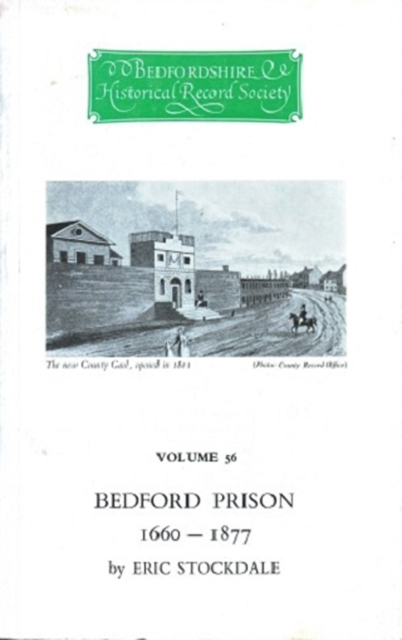Book contents
- Frontmatter
- Contents
- Acknowledgments
- Foreword
- Introduction
- Chapter 1 John Bunyan 1660-1688
- Chapter 2 Some Contemporaries of Bunyan
- Chapter 3 The Richardson-Howard Family of Jailers 1711-1814
- Chapter 4 Transportation to America Before 1776
- Chapter 5 John Howard 1773-1790
- Chapter 6 Samuel Whitbread 1790-1815
- Chapter 7 Philip Hunt 1815-1835
- Chapter 8 Philip Hunt 1815-1835
- Chapter 9 Lord John Russell In Office 1835-1841
- Chapter 10 The Rebuilding of The Jail 1839-1849
- Chapter 11 The Unsettled Years 1849-1853
- Chapter 12 The Final Years Before Nationalisation 1853-1877
- Conclusion
- Note On References and Spelling
- Appendix 1 Bedford in 1765
- Appendix 2 Jailers of Bedford 1710-1885
- Appendix 3 The Richardson-Howard Family
- Appendix 4 Site Plan of Bunyan’s Jail
- Appendix 5 Deed of Appointment of Jailers 1740
- Appendix 6 The Whitbread-Howard Link
- Appendix 7 Lord John Russell’s Family
- Appendix 8 Bedford in 1841
- Appendix 9 The Jail in 1849
- Index of Names
- Subject Index
- Bedfordshire Historical Record Society
- Miscellaneous Endmatter
Chapter 6 - Samuel Whitbread 1790-1815
Published online by Cambridge University Press: 03 August 2023
- Frontmatter
- Contents
- Acknowledgments
- Foreword
- Introduction
- Chapter 1 John Bunyan 1660-1688
- Chapter 2 Some Contemporaries of Bunyan
- Chapter 3 The Richardson-Howard Family of Jailers 1711-1814
- Chapter 4 Transportation to America Before 1776
- Chapter 5 John Howard 1773-1790
- Chapter 6 Samuel Whitbread 1790-1815
- Chapter 7 Philip Hunt 1815-1835
- Chapter 8 Philip Hunt 1815-1835
- Chapter 9 Lord John Russell In Office 1835-1841
- Chapter 10 The Rebuilding of The Jail 1839-1849
- Chapter 11 The Unsettled Years 1849-1853
- Chapter 12 The Final Years Before Nationalisation 1853-1877
- Conclusion
- Note On References and Spelling
- Appendix 1 Bedford in 1765
- Appendix 2 Jailers of Bedford 1710-1885
- Appendix 3 The Richardson-Howard Family
- Appendix 4 Site Plan of Bunyan’s Jail
- Appendix 5 Deed of Appointment of Jailers 1740
- Appendix 6 The Whitbread-Howard Link
- Appendix 7 Lord John Russell’s Family
- Appendix 8 Bedford in 1841
- Appendix 9 The Jail in 1849
- Index of Names
- Subject Index
- Bedfordshire Historical Record Society
- Miscellaneous Endmatter
Summary
The Member for Bedford
In the year in which John Howard died, 1790, his cousin Samuel Whitbread the Elder, who had been one of the Members of Parliament for Bedford since 1768, stood aside and let his son take over the seat. Samuel Whitbread the Younger (who will be referred to simply as Whitbread) sat for Bedford for the next twenty-five years, most of them taken up with war and therefore not years for expenditure on proposals like Howard’s.
In the House of Commons Whitbread soon made a name for himself as a man with a large streak of humanity. In 1795, concerned about the poverty he had witnessed in the county and elsewhere, he introduced a bill to enable magistrates to fix minimum wages for labourers, but it failed to get a second reading. In 1805 and the following year Whitbread was in the public eye as the manager of the impeachment of Lord Melville. When Melville was acquitted in June 1806 Whitbread took the result as a personal defeat. He may well earlier have made clear his strong views on the case to his friend and fellow Whig, John, 6th Duke of Bedford over the dinner table at Woburn, for the Duke’s thirteen-old-old son wrote in his diary: ‘What a pity that he who steals a penny loaf should be hung, whilst he who steals thousands of the public money should be acquitted’. This boy was Lord John Russell who was to become Prime Minister, but who will figure later in this work principally as Home Secretary during the crucial years 1835-39.
The year 1806 was extremely disappointing for Whitbread for another reason. When Grenville and Fox formed the administration of ‘All the Talents’ in February, he was entitled to consider himself a likely candidate for office in view of the eminence he had reached in the House by dint of a great deal of hard work for the Whigs. He received no post in the administration. His disappointment must have been made much more bitter as he saw one after another of his friends taking up their posts.
- Type
- Chapter
- Information
- Bedford Prison 1660-1877 , pp. 84 - 102Publisher: Boydell & BrewerFirst published in: 2023

